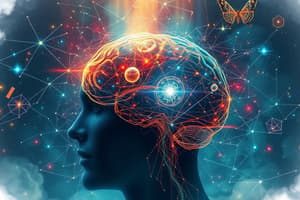Podcast
Questions and Answers
What is sensation?
What is sensation?
- Process of creating meaningful patterns from raw sensory information
- Transformation of one form of energy into another
- Ability to distinguish the difference between two stimuli
- Detection of physical energy emitted or reflected by physical objects (correct)
What is perception?
What is perception?
- Process of creating meaningful patterns from raw sensory information (correct)
- Amount of stimulation necessary for a stimulus to be detected
- Detection of physical energy emitted or reflected by physical objects
- Transformation of one form of energy into another
What stimulates a cell?
What stimulates a cell?
Light waves, vibrations, and airborne/bloodborne chemical molecules
What is transduction?
What is transduction?
What is psychophysics?
What is psychophysics?
What is the absolute threshold?
What is the absolute threshold?
What is the discrimination threshold?
What is the discrimination threshold?
What is the difference threshold?
What is the difference threshold?
What is Weber's law?
What is Weber's law?
What does Fechner's law express?
What does Fechner's law express?
What is Steven's power law?
What is Steven's power law?
What is signal detection theory?
What is signal detection theory?
What is subliminal persuasion?
What is subliminal persuasion?
Flashcards are hidden until you start studying
Study Notes
Sensation and Perception Concepts
- Sensation involves detecting physical energy emitted or reflected by objects, forming the basis of sensory experiences.
- Perception is the cognitive process of organizing and interpreting sensory information to make it meaningful.
Stimuli That Affect Cells
- Stimuli that can stimulate sensory cells include light waves, vibrational forces, and airborne or bloodborne chemical molecules.
Transduction Process
- Transduction refers to converting one form of energy into another that the brain can interpret, enabling sensory perception.
Psychophysics Field
- Psychophysics examines the relationship between the physical properties of stimuli and the psychological experiences they evoke.
Thresholds of Sensory Detection
- Absolute threshold is the minimum level of stimulation needed for a stimulus to be detected 50% of the time.
- Discrimination threshold indicates the capability to distinguish between two different stimuli.
- Difference threshold represents the smallest change in a stimulus that can be noticed half of the time.
Laws of Sensory Perception
- Weber's Law states that the Just Noticeable Difference (JND) is proportional to the intensity of the stimulus, meaning larger stimuli require larger changes to notice a difference.
- Fechner's Law describes the relationship between a stimulus's actual magnitude and its perceived magnitude, providing a mathematical framework for understanding perception.
- Stevens' Power Law focuses on the intensity of actual stimuli and how they are perceived, highlighting non-linear relationships in sensory experiences.
Signal Detection Theory
- Signal detection theory emphasizes that we actively select signals based on the stimulation affecting our sensory organs, separating relevant from irrelevant stimuli.
Subliminal Persuasion
- Subliminal persuasion refers to presenting stimuli beneath an individual's conscious awareness, which may influence thoughts or behaviors without them being consciously aware of it.
Studying That Suits You
Use AI to generate personalized quizzes and flashcards to suit your learning preferences.




